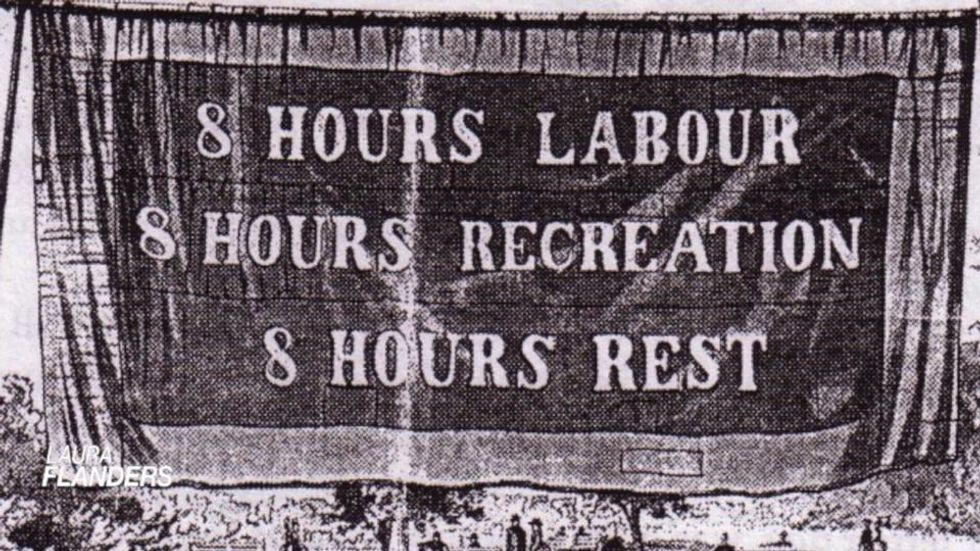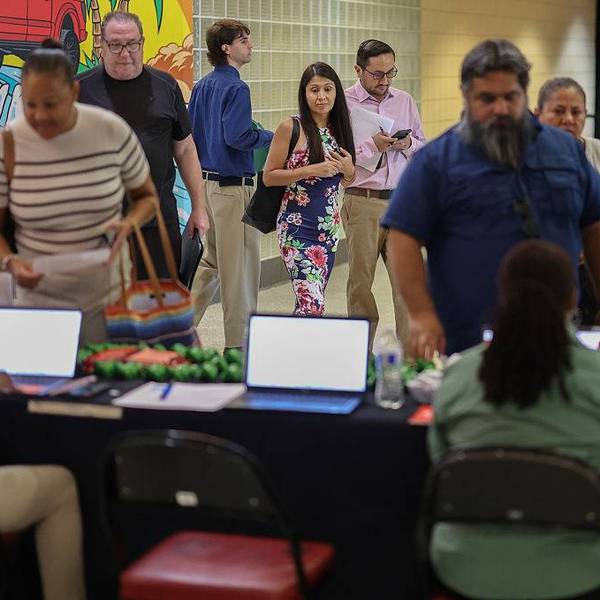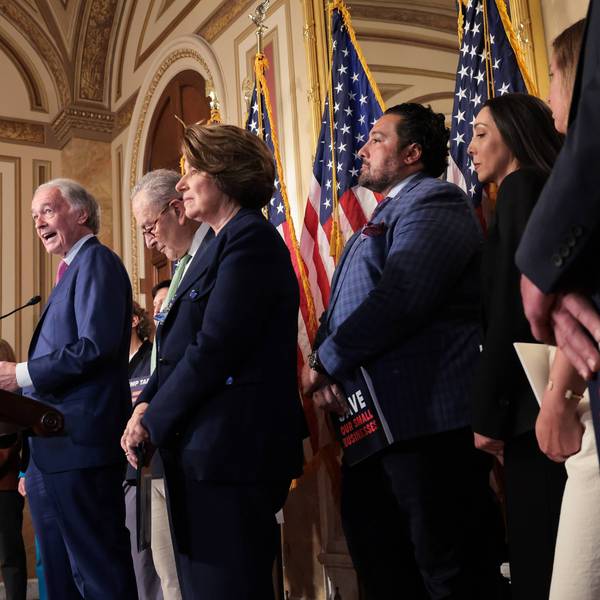Americans Are Working Too Damn Hard
The anniversary of Dr. King's March on Washington for Jobs and Freedom is coming up.
A lot of us will go to Washington again to mark that occasion, and we'll march for jobs again, as well we should, given the current climate. But can I admit something?
I wish we were marching for less work, not more of it.

A lot of us will go to Washington again to mark that occasion, and we'll march for jobs again, as well we should, given the current climate. But can I admit something?
I wish we were marching for less work, not more of it.
I know, it's cheeky to talk about time off. Unemployment is high and jobs are scarce. Americans are supposed to feel grateful to have paid work at all. A vacation too? We're so busy tightening our belts and "leaning in" that even when we do get vacation days at work, we often skip them. Admit it - did you feel guilty taking every last day this summer, or (more likely) guilty that you didn't?
A study by a workforce consulting firm in 2011 reported that 70 percent of employees said they were leaving vacation days on the table. The vast majority of workers, meanwhile, would love some time off, but ours is the last rich country in the world where offering paid time off to workers is optional.
Americans work almost five weeks more a year than our contemporaries in Europe . Family leave is still unpaid under federal law, and the big bosses' lobbies are working like mad to scuttle paid sick days legislation coming out of states and cities.
So we'll march. We'll march for jobs but where do you line up for the march for leisure?
The last time US labor unions marched for that, it was for the eight-hour day, after the depression of 1884. Their banners called for eight hours work and eight hours rest and eight hours for what we will.
The "what we will" part seems to have fallen off the map in the 1930s - and we've had no reductions in work hours since, Duke Professor Kathi Weeks told GRITtv in an interview this week.
The American labor force is the smallest it's been in 20 years and that's not changing. Globalization and computerization are shrinking the demand for US labor. Job sharing and a shorter work-week make sense economically and socially.
Even by raising the topic Kathi Weeks hopes that we might begin to think more critically and imaginatively about, "the possibilities about a life that's not so relentlessly subordinated to work."
If we weren't working so hard, what would we do? If weren't willing to concede to every outrageous demand that we work longer and harder, what would we demand, then?
You can find my conversation with Weeks, the author of The Problem with Work, at GRITtv.org.
An Urgent Message From Our Co-Founder
Dear Common Dreams reader, The U.S. is on a fast track to authoritarianism like nothing I've ever seen. Meanwhile, corporate news outlets are utterly capitulating to Trump, twisting their coverage to avoid drawing his ire while lining up to stuff cash in his pockets. That's why I believe that Common Dreams is doing the best and most consequential reporting that we've ever done. Our small but mighty team is a progressive reporting powerhouse, covering the news every day that the corporate media never will. Our mission has always been simple: To inform. To inspire. And to ignite change for the common good. Now here's the key piece that I want all our readers to understand: None of this would be possible without your financial support. That's not just some fundraising cliche. It's the absolute and literal truth. We don't accept corporate advertising and never will. We don't have a paywall because we don't think people should be blocked from critical news based on their ability to pay. Everything we do is funded by the donations of readers like you. Will you donate now to help power the nonprofit, independent reporting of Common Dreams? Thank you for being a vital member of our community. Together, we can keep independent journalism alive when it’s needed most. - Craig Brown, Co-founder |

A lot of us will go to Washington again to mark that occasion, and we'll march for jobs again, as well we should, given the current climate. But can I admit something?
I wish we were marching for less work, not more of it.
I know, it's cheeky to talk about time off. Unemployment is high and jobs are scarce. Americans are supposed to feel grateful to have paid work at all. A vacation too? We're so busy tightening our belts and "leaning in" that even when we do get vacation days at work, we often skip them. Admit it - did you feel guilty taking every last day this summer, or (more likely) guilty that you didn't?
A study by a workforce consulting firm in 2011 reported that 70 percent of employees said they were leaving vacation days on the table. The vast majority of workers, meanwhile, would love some time off, but ours is the last rich country in the world where offering paid time off to workers is optional.
Americans work almost five weeks more a year than our contemporaries in Europe . Family leave is still unpaid under federal law, and the big bosses' lobbies are working like mad to scuttle paid sick days legislation coming out of states and cities.
So we'll march. We'll march for jobs but where do you line up for the march for leisure?
The last time US labor unions marched for that, it was for the eight-hour day, after the depression of 1884. Their banners called for eight hours work and eight hours rest and eight hours for what we will.
The "what we will" part seems to have fallen off the map in the 1930s - and we've had no reductions in work hours since, Duke Professor Kathi Weeks told GRITtv in an interview this week.
The American labor force is the smallest it's been in 20 years and that's not changing. Globalization and computerization are shrinking the demand for US labor. Job sharing and a shorter work-week make sense economically and socially.
Even by raising the topic Kathi Weeks hopes that we might begin to think more critically and imaginatively about, "the possibilities about a life that's not so relentlessly subordinated to work."
If we weren't working so hard, what would we do? If weren't willing to concede to every outrageous demand that we work longer and harder, what would we demand, then?
You can find my conversation with Weeks, the author of The Problem with Work, at GRITtv.org.

A lot of us will go to Washington again to mark that occasion, and we'll march for jobs again, as well we should, given the current climate. But can I admit something?
I wish we were marching for less work, not more of it.
I know, it's cheeky to talk about time off. Unemployment is high and jobs are scarce. Americans are supposed to feel grateful to have paid work at all. A vacation too? We're so busy tightening our belts and "leaning in" that even when we do get vacation days at work, we often skip them. Admit it - did you feel guilty taking every last day this summer, or (more likely) guilty that you didn't?
A study by a workforce consulting firm in 2011 reported that 70 percent of employees said they were leaving vacation days on the table. The vast majority of workers, meanwhile, would love some time off, but ours is the last rich country in the world where offering paid time off to workers is optional.
Americans work almost five weeks more a year than our contemporaries in Europe . Family leave is still unpaid under federal law, and the big bosses' lobbies are working like mad to scuttle paid sick days legislation coming out of states and cities.
So we'll march. We'll march for jobs but where do you line up for the march for leisure?
The last time US labor unions marched for that, it was for the eight-hour day, after the depression of 1884. Their banners called for eight hours work and eight hours rest and eight hours for what we will.
The "what we will" part seems to have fallen off the map in the 1930s - and we've had no reductions in work hours since, Duke Professor Kathi Weeks told GRITtv in an interview this week.
The American labor force is the smallest it's been in 20 years and that's not changing. Globalization and computerization are shrinking the demand for US labor. Job sharing and a shorter work-week make sense economically and socially.
Even by raising the topic Kathi Weeks hopes that we might begin to think more critically and imaginatively about, "the possibilities about a life that's not so relentlessly subordinated to work."
If we weren't working so hard, what would we do? If weren't willing to concede to every outrageous demand that we work longer and harder, what would we demand, then?
You can find my conversation with Weeks, the author of The Problem with Work, at GRITtv.org.

